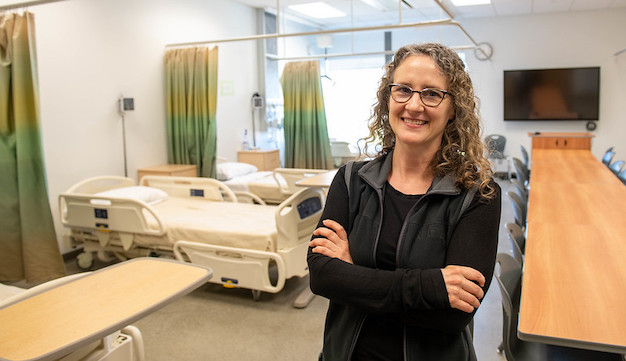Lee-Anne Stephen takes on new experiential learning coordinator role for School of Health Studies programs

Practice makes perfect. Or at least brings us closer to it.
In nursing education at UFV, there is a lot of practice before students graduate and take qualifying exams to become registered nurses.
Much of that practice comes in the form of clinical education, time spent by nursing students on hospital wards and in community settings under the guidance of UFV faculty and clinical supervisors.
But students also practise their skills through various forms of experiential learning, so that they are better prepared when they do hit the wards for their clinical placements.
“When students engage in on-campus experiential learning activities, they are more practice-ready, which then maximizes learning in the clinical setting,” says Cindy Schultz, Associate Dean of Health Sciences at UFV. “Students are then better able to learn in a reactive learning environment when they have been exposed to controlled, realistic, intentionally focused learning experiences, in the laboratory settings. On-campus experiential learning activities are not meant to replace clinical learning, but rather to augment it.”
To that end, UFV faculty member Lee-Anne Stephen has been assigned the full-time role of experiential learning coordinator for nursing education at UFV. Experiential learning opportunities for students include mannequin simulation, virtual reality simulation, skills lab training, and online interactive strategies such as “serious games”, where students pick what they think is the right course of action in a “choose your own adventure”-style simulation.
In her new role, Stephen is working with health sciences faculty to assess student training needs, find out more about available resources, and create new ones. She is also part of a provincial nursing experiential learning committee.
Stephen is consulting with content experts, such as those with expertise in nursing simulation exercises, to help make the student experiences more relevant.
“We are looking across our labs and other student experiences and exploring how to make them more meaningful,” notes Schultz. “We want to re-think the way we run labs to help better prepare students for clinical settings. This is phase one in a full lab redevelopment plan.”

One recent example for Semester 7 nursing students, who are nearing the end of their degree program, involved senior students identifying one skill or situation that they wished they had more time to learn during their previous semesters. They then recruited volunteer students from Semesters 1–6 and teach them about that one topic in a peer mentorship model. The senior students get to review their knowledge, articulate it, and pass it on to help prepare the junior students. This activity was suggested by faculty member Pam Causton and Stephen helped to operationalize it.
Another example is a day-long simulation for Semester 7 students during their clinical rotation. Once a week nursing professor Pam Causton acts as a patient, and each week the students review her case, interact with her, and add to her chart. Stephen collaborated with Causton and nursing faculty member Joanne Brown on this project.
One of the benefits of the types of experiential learning offered to nursing students at UFV is the controlled environment.
“For students, offering experiential learning in a controlled environment provides a bridge, so that they have a chance to learn in a less risky setting and will be better prepared to take full advantage of the clinical setting when they get to it.
The COVID-19 pandemic accelerated new ways of approaching nursing education, Schultz and Stephen note.
“Some of what we are looking at implementing is in response to new innovative methods that were developed during the pandemic restrictions.”
Stephen is also looking to partner with other areas of the university.
“We see possibilities of partnering with students and faculty from a variety of programs for activities, working with other departments such as Teaching and Learning to enhance the learning experience.”
Contact Lee-Anne Stephen at lee-anne.stephen@ufv.ca




